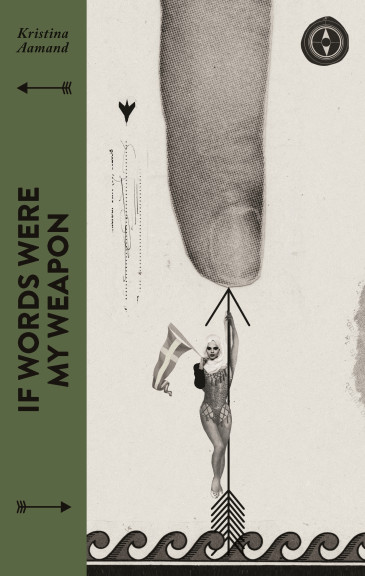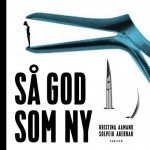Synopsis
A raw and gripping YA novel about falling in love with the wrong person and the price we sometimes have to pay for following our heart.
17-year-old Sheherazade feels caught between her mother's expectations of her as a good Muslim girl and her classmates, who live very different lives. Trying to keep her head above water, she writes fanzines about the refugee experience in Denmark - her mum would rather that she became a doctor.
Sheherazade is her father's daughter, but when he is hospitalised, it gets harder for her to cope with the pressure and when she meets Thea, suddenly a new world opens up. Sheherazade falls in love, but is she willing to pay the price?
Reviews
"Kristina Aamand accompanies her young protagonist in an elegant and eloquent manner in her compact novel (…) With her refined and authentic style of writing, the author emphasises the direct manner of the young Muslim woman and offers a differentiated view of her confusing reality (…) Like a red thread through the narrative, the impressive collages (zines), made of pictures and words, creatively connect emotions and thoughts. This many-facetted coming-of-age story encourages individuality and self-esteem." – (The German JugendJury committee)
"The fact that young Sana Bakkoush was the central character of the last season of the successful Norwegian TV series Skam is a clear indicator that times are changing. This also holds true for literature. People are finally starting to tell the stories of those who have so far been given little attention: girls from Muslim families. Skam’s Sana and Sheherazade, the protagonist of this multicultural novel, show how difficult it is for a girl or a woman to negotiate life between two conflicting worlds: family life ruled by traditional values and the completely different customs and norms of the outside world. Their lives are minefields. Sheherazade manages to strike a balance between both; yet when she falls in love with a girl – Thea, the daughter of a well-off, leftist intellectual family – everything starts toppling over. Kristina Aamand narrates this story with a knack for self-irony and a clear socially critical edge." – (The White Raven Prize committee)
"„ ...a wise and moving novel!" – (Dagbladenes Bureau)
"A magnificent winner (...) it is hard to imagine that a manuscript submitted to Carlsen’s competition on Best YA novel could be better than Kristina Aamand’s funny, sad and wise novel." – (Politiken)
"In no way had I foreseen that I was sitting with a book, which I would not put down before I had finished it and which in the next four hours would make me sob all the way from my stomach on several occasions" – (Folkeskolen.dk (magazine for teachers))
"Kristina Aamand hatte den Wunsch, eine Brücke zu bauen und Verständnis zu wecken: Mit ihrem Buch ist ihr das eindrücklich gelungen!" – (Deutschlandfunk Kultur)
"Aamand hat ein fesselndes, aufschlussreiches Buch geschrieben, das mit einem überraschenden Ende aufwartet." – (Der Tagesspiegel)
Personal note from the author
Thanks so much for your interest in Shezerazade and her story about love across cultures.
I would like to share my motives for writing this novel and give you a better idea about who the author behind a book with a sensitive political topic is. I grew up with a Danish mother and a Palestinian father. With Christianity and Islam. My parents argued over religion, tradition and truth and both fought to keep their cultural points of identification. I learnt at an early age that truth is subjective and most importantly: that you cannot make everyone happy.
Is it possible that someone gets insulted by Shezerazade’s tale? The short and honest answer is yes.
A very conservative person might get insulted that Shezerazade’s father is a poet who has lived a carefree life where everyone “did lesbian”. It would on the other hand please a liberal person. However, a very liberal person might get insulted that Shezerazade’s mother is traditional in her world-view. A traditional person may be happy to hear that She’s mother upholds traditions. A Muslim girl who lives very religiously might be insulted to read about a Muslim girl who falls in love with a girl. A liberal Muslim girl, who believes that you can easily be a Muslim and a lesbian at the same time, might on the other hand approve. A girl with no other-ethnic background might be insulted that She wears a head scarf. She might find it repressive. A Muslim girl might find it sympathetic that Shezerazade honours her parents in this way. After that, a Muslim woman might get insulted that Shezerazade takes her scarf off. It would please the liberal person who will, however, continue to be insulted by the traditional mother.
How can we tell an important love story, a story about identity and cultural gaps without insulting someone?
1. If you want to be insulted, you will be insulted.
2. What is the motive for telling the story? Is it to create divides, nurture hatred, create resistance? Or is it to show how the world looks when you, as Shezerazade, bear a great responsibility for your parents’ happiness on your shoulders and at the same to fight an inner and outer battle to belong? To be loved and to love.
My motive is to bridge the gap between people. And that bridge is called love.
I am not a debater. I pulled out of that industry many years ago when I realised that I obtained the opposite of what I wanted. I have worked as a nurse and social worker with ethnical minorities for over twenty years. And I started writing as a counterweight to the fast headlines. Literature can be something very special. We get to understand and feel other people, seeing the world through different eyes. Books provided me with peaceful retreat when my parents were loudly dicussing Jesus vs Mohammed and the books whispered to me: Life can be like this too. That is Shezerazade’s message: Life can be like this too!




